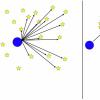I cannot understand why BIll Gates (who is heavily invested in - and stands to be come even more obscenely wealthy from the vaccine roll-out) was a person of such influence during the whole pandemic - as if he was some sort of expert - on TV constantly. He is not a doctor. Not a researcher. Not a computer programmer. Not even a college grad. Why was he influencing the public's perception of this pandemic to such a huge degree.
He seems to have gone into hiding now: https://www.lewrockw...r-up-continues/
Most likely he has all the qualifications someone was looking for, based on his prior work, with similar ideas to current thinking, in Africa.
In addition his willingness to do business in a particular manner that might prove distasteful to others.
https://digitalcommo...text=annlsurvey
In 2010, the Gates Foundation funded experimental malaria and meningitis vaccine trials across Africa and HPV vaccine programs in India. All of these programs resulted in numerous deaths and injuries,
with accounts of forced vaccinations and uninformed consent.
Ultimately, these health campaigns, under the guise of saving lives, have relocated large scale clinical trials of untested or unapproved drugs to developing markets where administering drugs is less regulated and cheaper.
https://en.wikipedia...crosoft_lawsuit
Microsoft lawsuit[edit]
In 1993, Microsoft released MS-DOS 6.0, which included a disk compression program called DoubleSpace. Microsoft had previously been in discussions with Stac to license its compression technology, and had discussions with Stac engineers and examined Stac's code as part of the due diligence process. Stac, in an effort led by attorney Morgan Chu, sued[3] Microsoft for infringement of two of its data compression patents, and won; in 1994, a California jury ruled the infringement by Microsoft was not willful, but awarded Stac $120 million in compensatory damages, coming to about $5.50 per copy of MS-DOS 6.0 that had been sold. The jury also agreed with a Microsoft counterclaim that Stac had misappropriated the Microsoft trade secret of a pre-loading feature that was included in Stacker 3.1, and simultaneously awarded Microsoft $13.6 million on the counterclaim.[4]
While Microsoft prepared an appeal, Stac obtained a preliminary injunction from the court stopping the sales of all MS-DOS products that included DoubleSpace; by this time Microsoft had already started shipping an "upgrade" of MS-DOS to its OEM customers that removed DoubleSpace. By the end of 1994, Microsoft and Stac settled all pending litigation by agreeing that Microsoft would make a $39.9 million investment in Stac Electronics, and additionally pay Stac about $43 million in royalties on their patents.
































 This topic is locked
This topic is locked
































